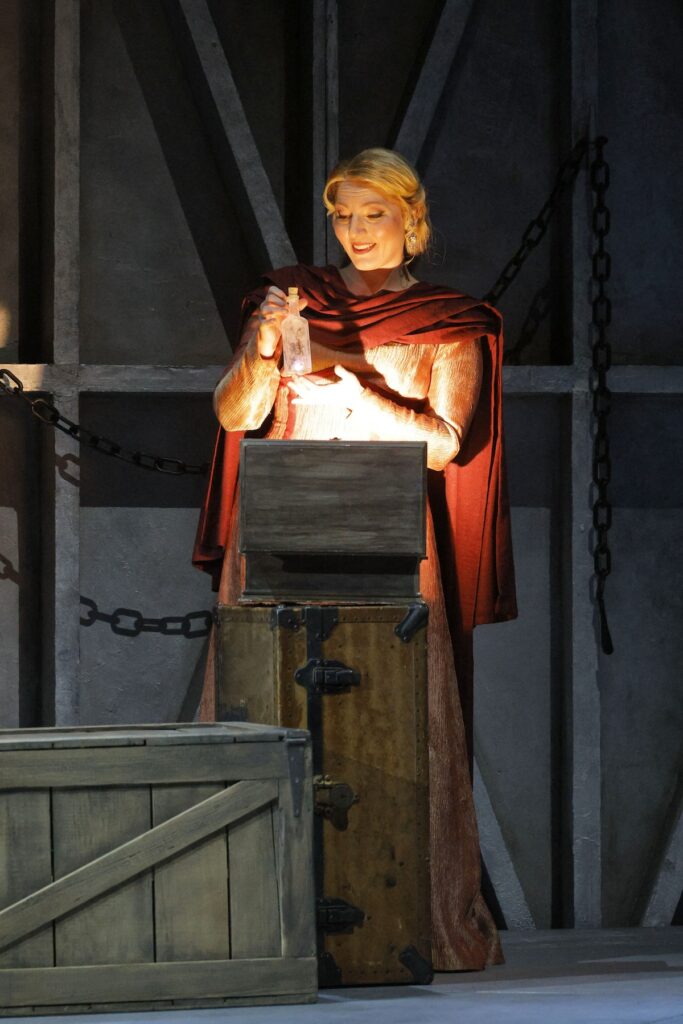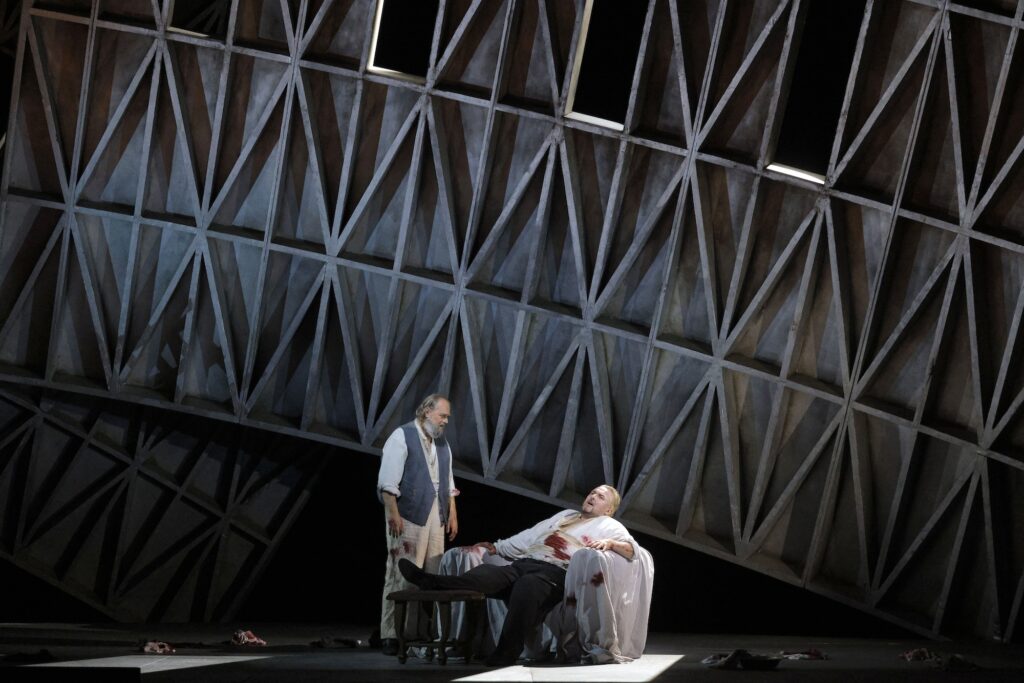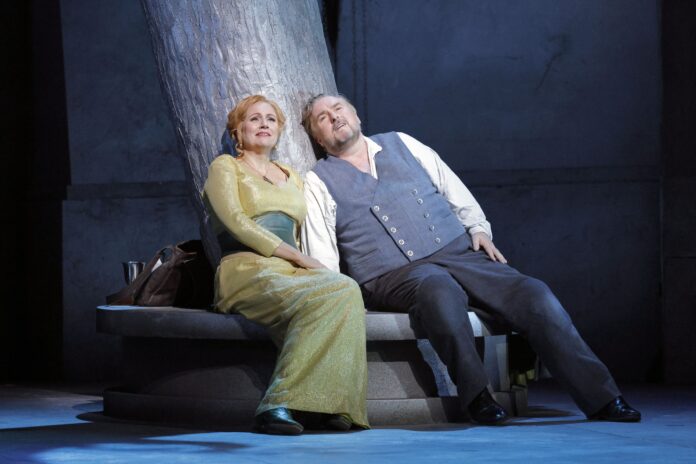Eun Sun Kim’s work on SF Opera’s latest production seems like a celebration of her recent contract extension as music director. Sure, the company chooses its annual line-up months in advance and Wagner is nothing if not bombastic, but watching her ebb and flow the orchestra along musical waves of Tristan and Isolde (through November 5 at the War Memorial Opera House, SF) is truly watching someone in their element. This entire season has been primarily defined by the personal touch she’s brought to their productions (the company is currently running a documentary on her work with last year’s Lohengrin), and this one is no different. This is fun for her.
The expanse of the War Memorial stage (with sets by British designer Robert Innes Hopkins) certainly gives her plenty of space in which to stretch her proverbial legs; as does the five-hour runtime of Wagner’s mad-love epic.
Based on the tale that influenced Romeo & Juliet, our story find Irish princess Isolde (German soprano Anja Kampe) all-but-imprisoned aboard a ship bound for Cornwall, where she’s to be married to King Marke (South Korean bass Kwangchul Youn). As it happens, Isolde’s captor and transporter is Tristan (New Zealand tenor Simon O’Neill), the renowned Cornish knight who killed Isolde’s former fiancé, Morold. If that weren’t enough, Isolde previously found the battle-wounded Tristan and nursed him back to health. Yet, in lieu of gratitude, she’s a gift for Tristan’s king.
Not willing to go quietly, Isolde and handmaid Brangäne (German mezzo Annika Schlicht) plan to trick Tristan into consuming one of the potions the mystic princess has brought with her. To Brangäne’s shock, poison is chosen, with Isolde planning for both she and Tristan to drink it. Defying her mistress’ orders, Brangäne switches the bottle with another: a love potion. The effects are immediate.

This, obviously, doesn’t bode well for Tristan, madly infatuated but devoutly loyal to his king. Nor does it help matters when Tristan’s good friend and fellow knight, Melot, picks up on the amorous vibes between the travelling couple. As with the Shakespearean tale it inspired, this story of star-cross’d lovers will not end happily.
Wagner was an old-fashioned romantic in every conceivable way. It never mattered whether his couples actually lived happily ever after, what was important was that their love was so powerful that it seemed the very world itself was out to destroy it. He saw love as being as an elemental force of nature, but far more destructive. That’s why it made sense for him to have characters wax on at length about their need to be together: soon, they probably won’t be.
Assembled to do the bloviating are a fine cast of performers (with Schlicht’s turn as Brangäne being especially captivating), though director Paul Curran’s blocking sometimes feels constrictive. In the first act, for instance, he has Tristan and servant Kurwenal (German bass Wolfgang Koch) in the same room as Isolde and Brangäne, stretching credulity when the maid and servant have to fetch their respective masters who are only several feet away from them. Similarly, later scenes could have done more with the open space. Perhaps it’s the fact that most of the five-hour opera consists of two characters alone, but there were a number of opportunities for blocking flourishes that weren’t taken.

Yet, for all that does or doesn’t happen onstage, with its early-20th-century aesthetic, the real star of the show is the conductor in front of it, building every crescendo from smolder to eruption. Kim’s tenure at SF Opera has been defined by her innate ability to tap into the power of every note on the pages before her. She knows which how to layer the orchestra’s performance just right so that the score has texture rather than just noise. Putting another Wagner piece at her disposal is like inviting a child to Wonka’s factory, only she doesn’t gorge herself so much as enjoy each and every piece as if it were her last. When this is the result, one can’t really blame her, can they?
There were a few technical errors during the livestream. The first five-or-so minutes of the opera proper lacked subtitles, making it a bit hard to directly follow for those of us who don’t speak German. There were also a few noticeable glitches in the feed that would un-sync the audio and video, though only for a few seconds. Other than that, it was fine, just noticeable compared to previous streams. And the fact that it was streamed meant there was no need to mask in front of my TV. (Though I will say that I only saw one white N95 mask amongst the audience members shows during the final bow.)
With its 102nd season officially underway and two grand epics already done, the image of the output of the SF Opera suggests a welcome stability when compared to other Civic Center institutions. The Opera’s tumult is left on stage, with the woman holding the baton revealed as the most volcanic of all. If nothing else, the epic runtime of the show mirrors the number of years SF Opera would love for Kim to work her magic.
TRISTAN AND ISOLDE runs through November 5 at the War Memorial Opera House, SF. Tickets and further info here.



